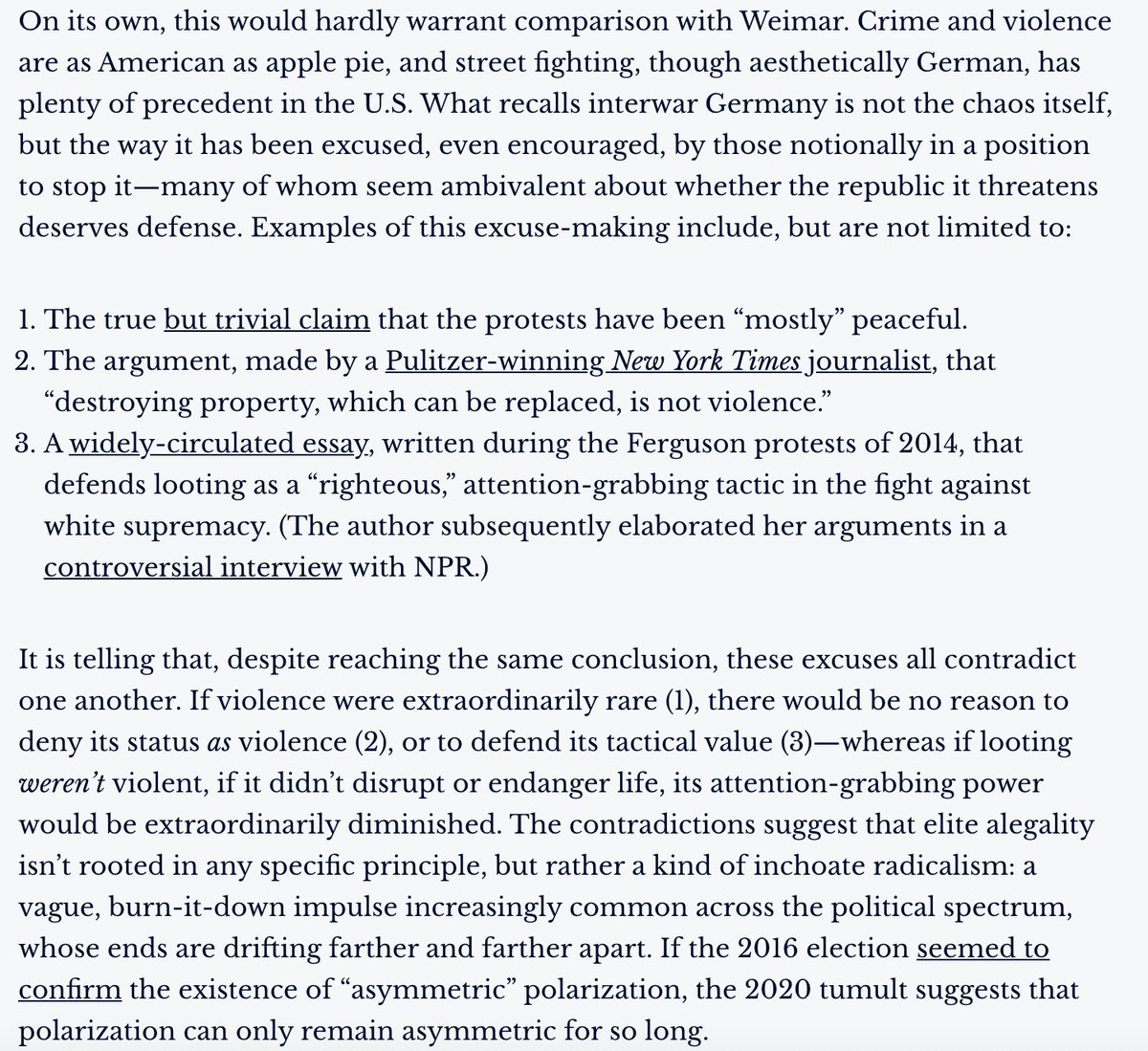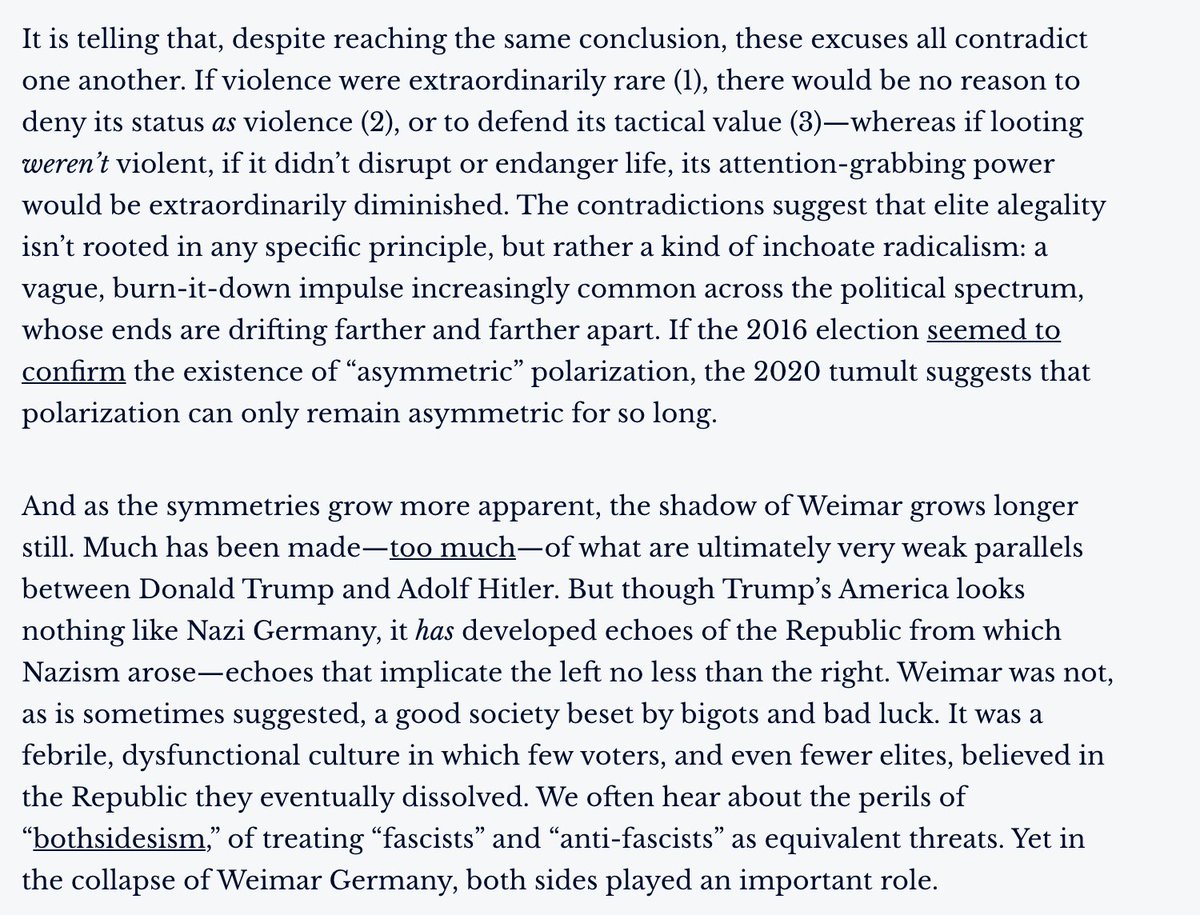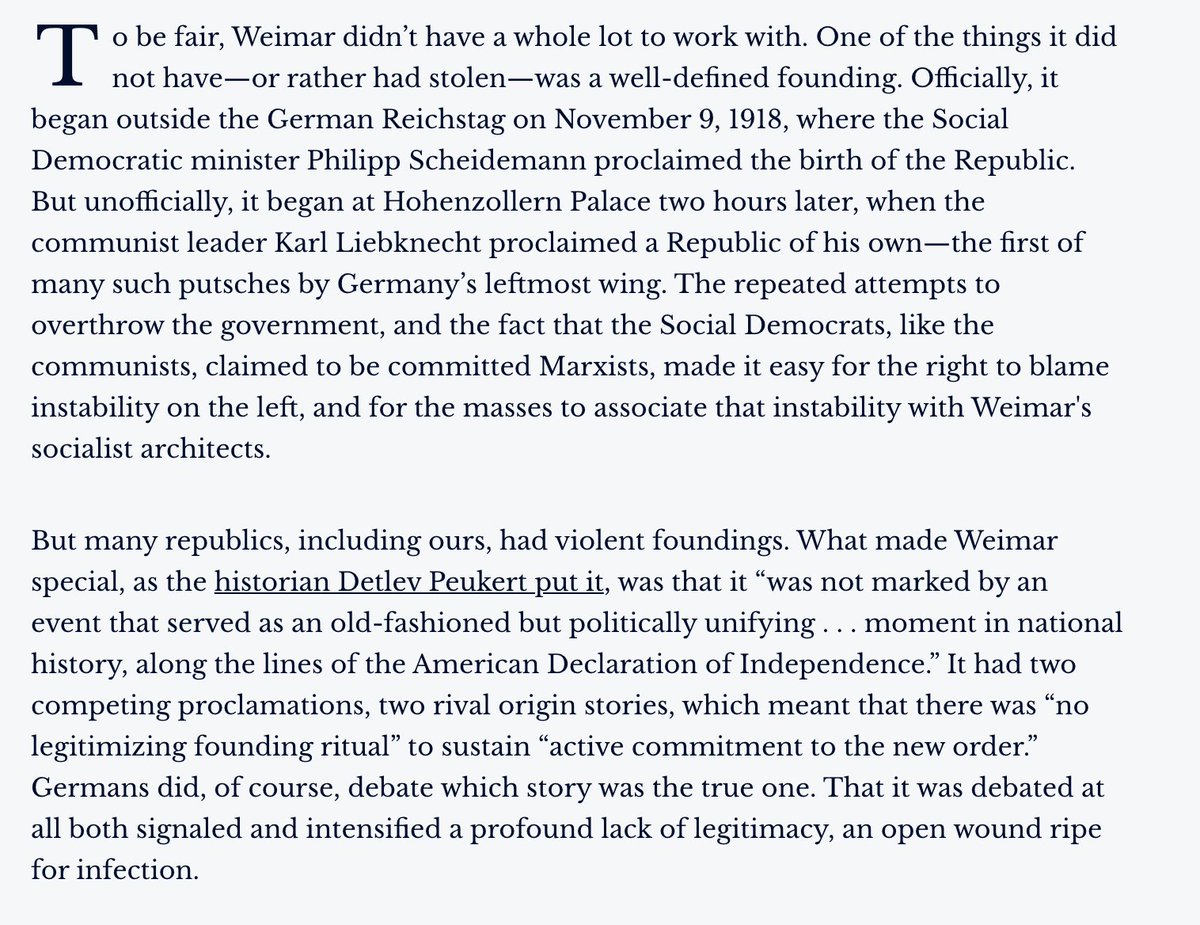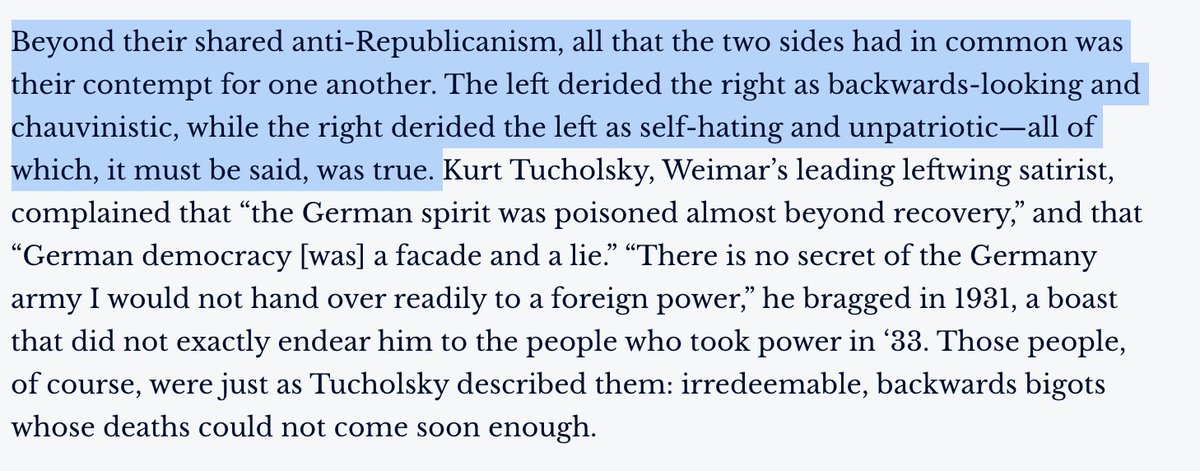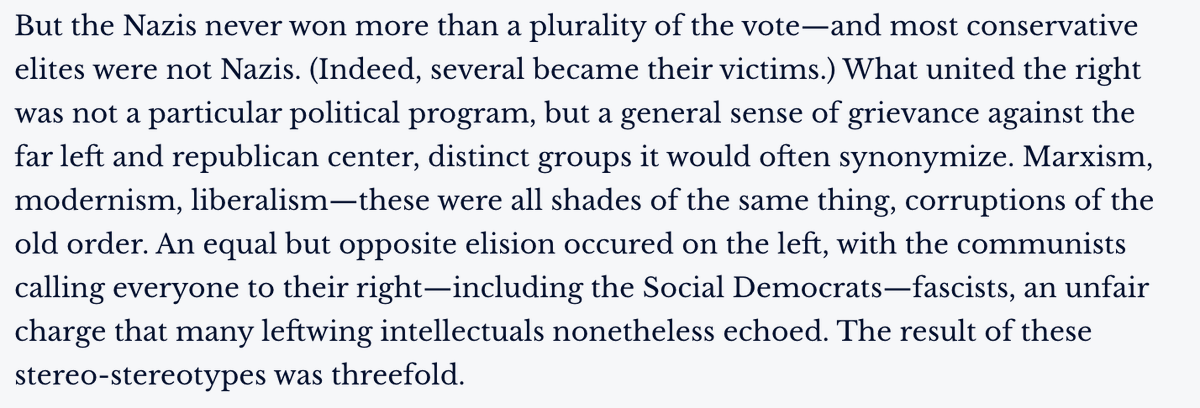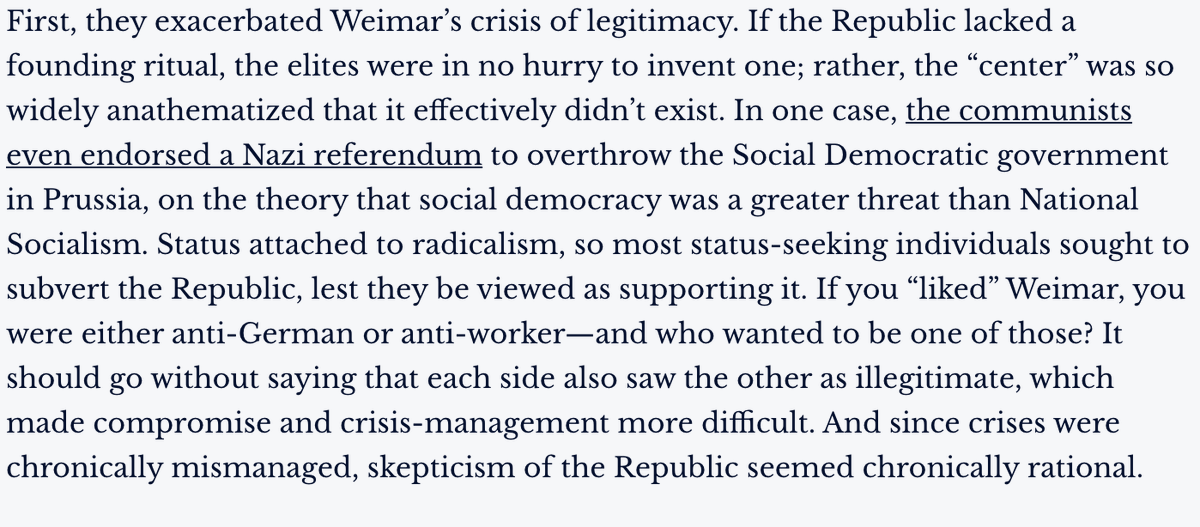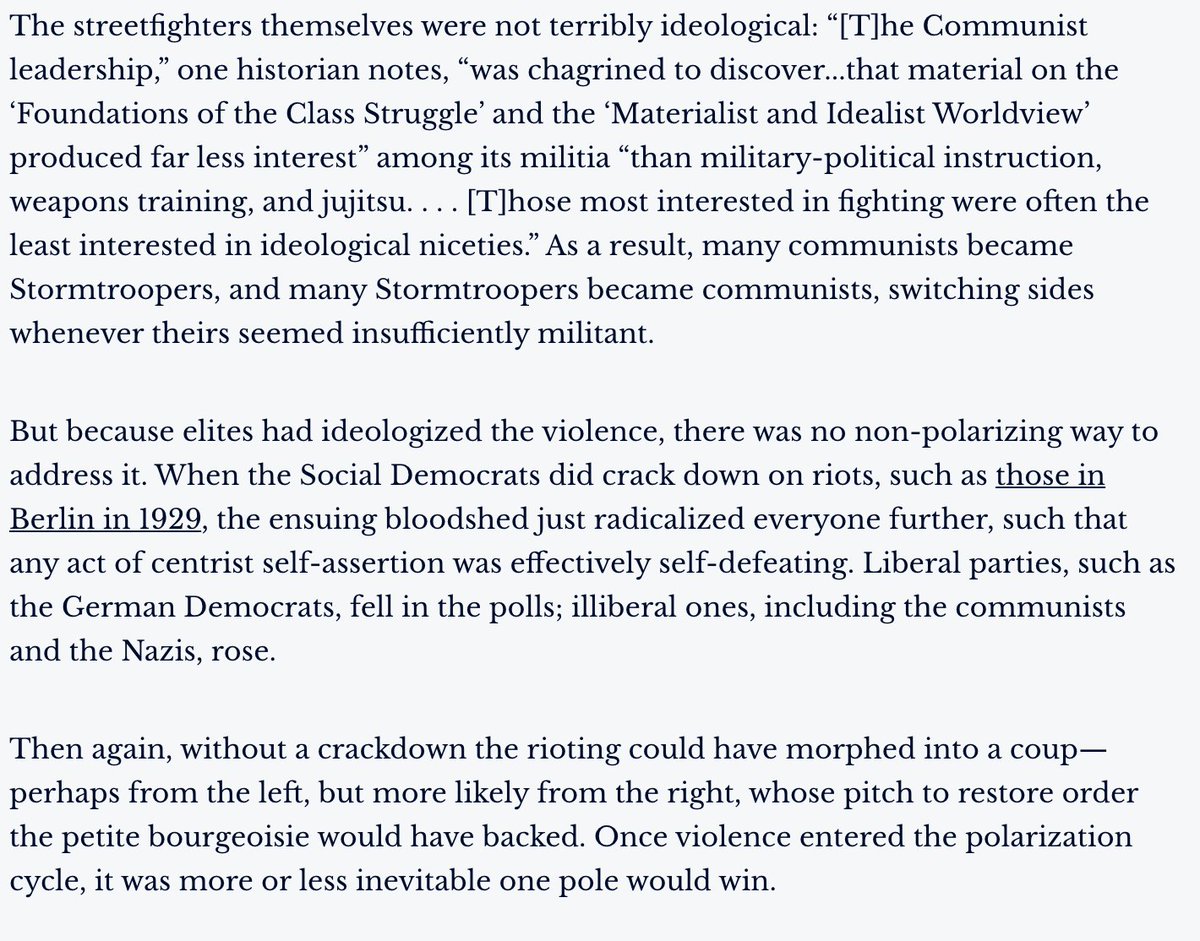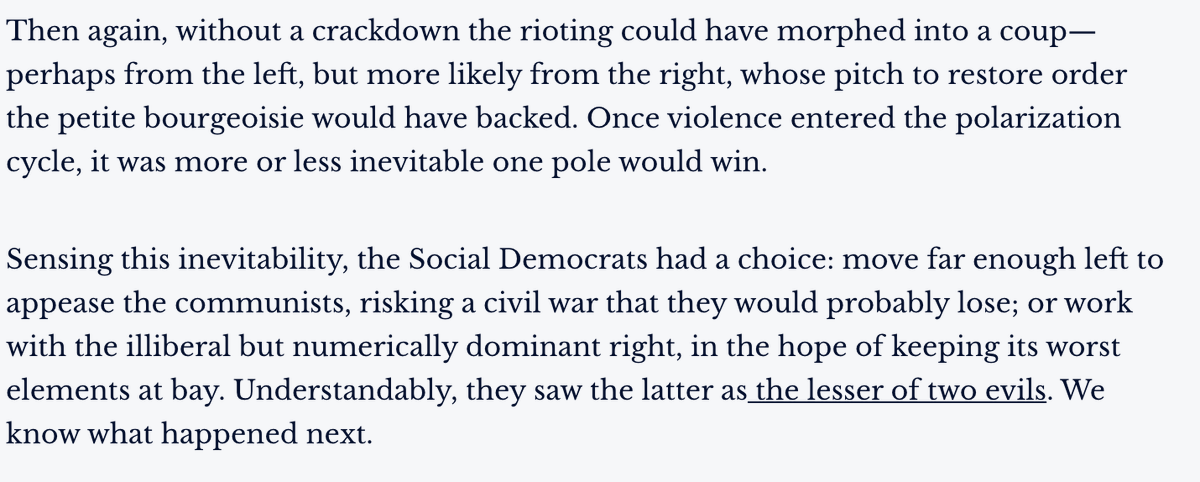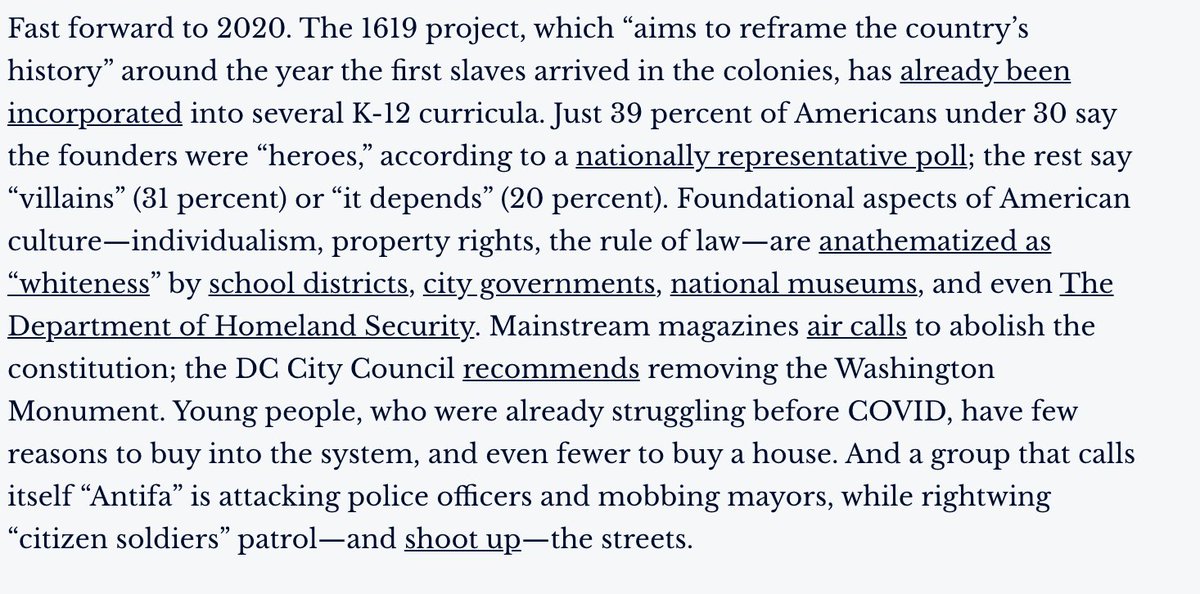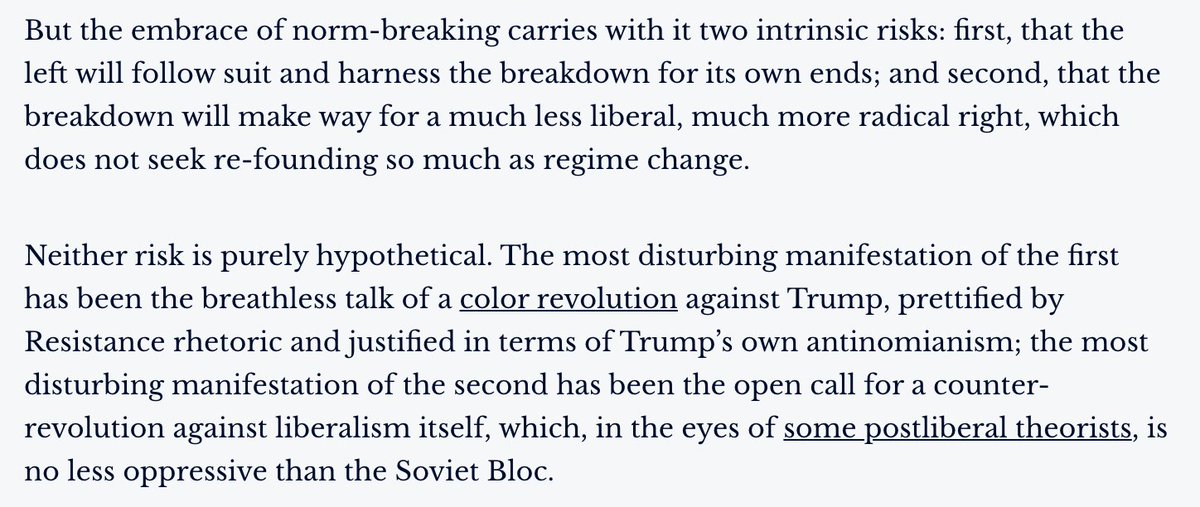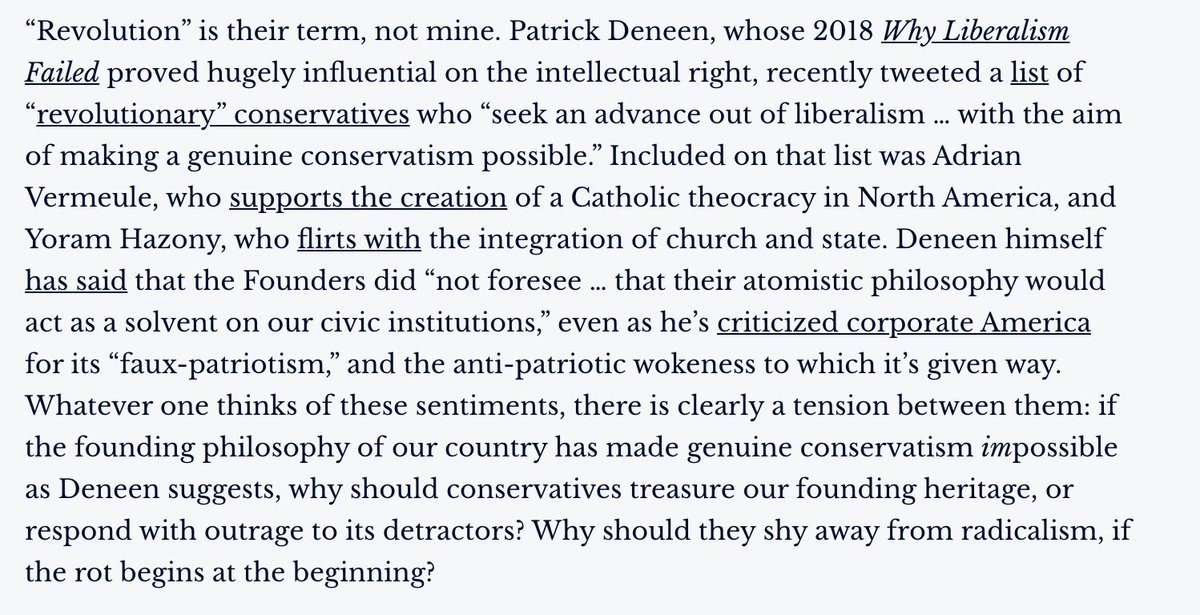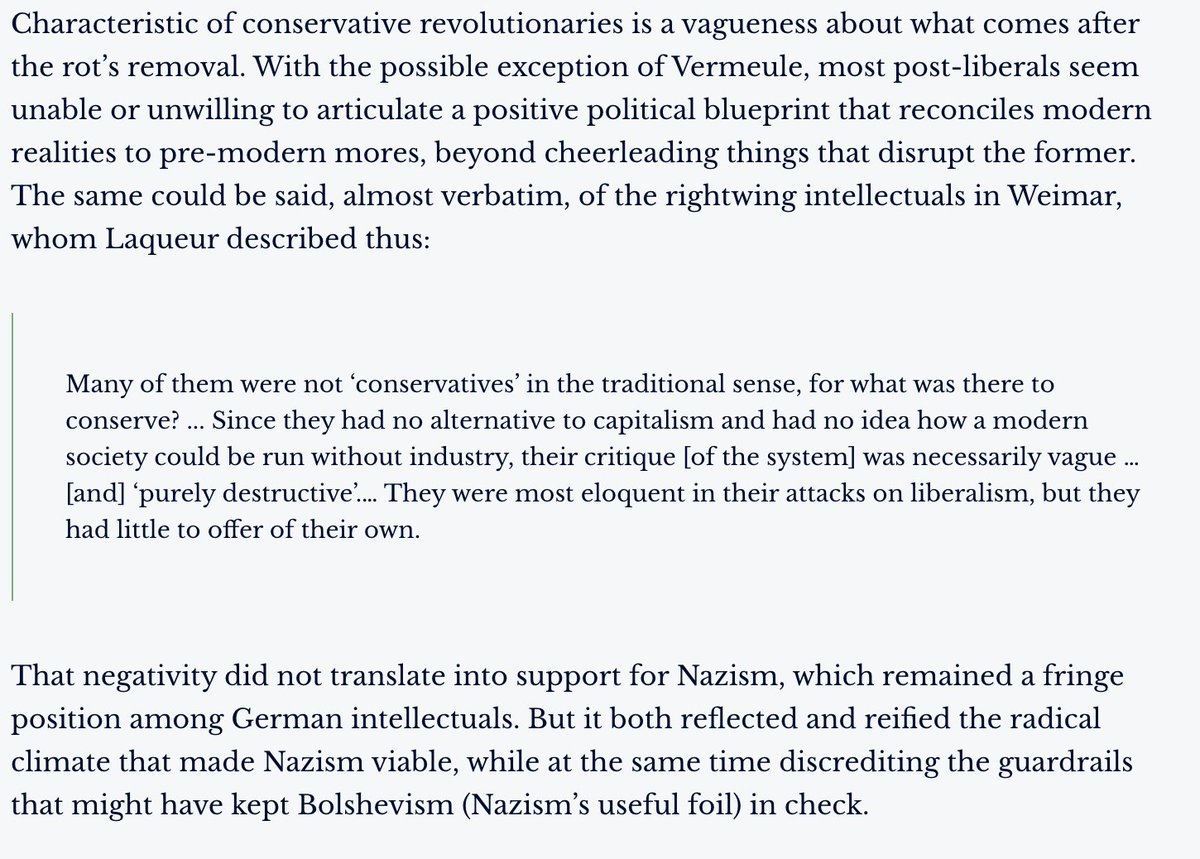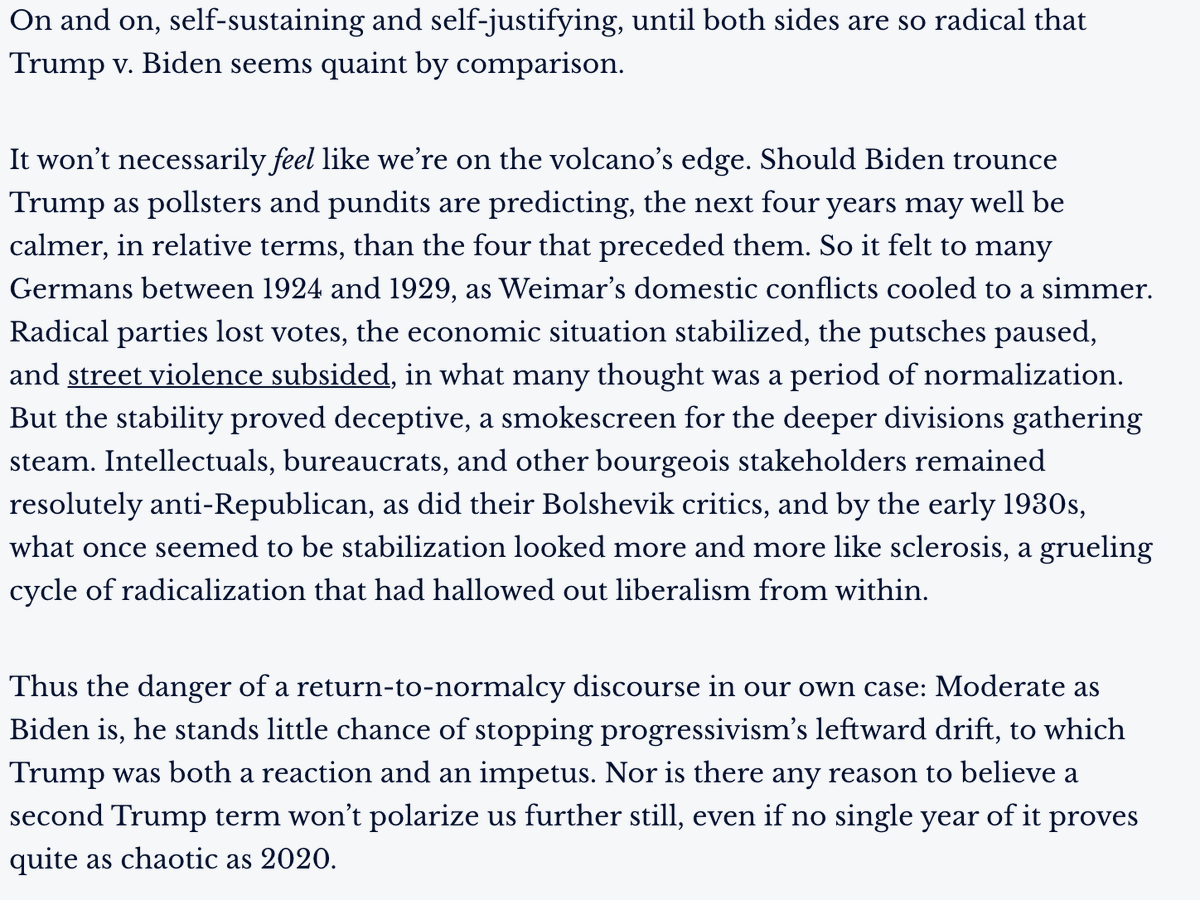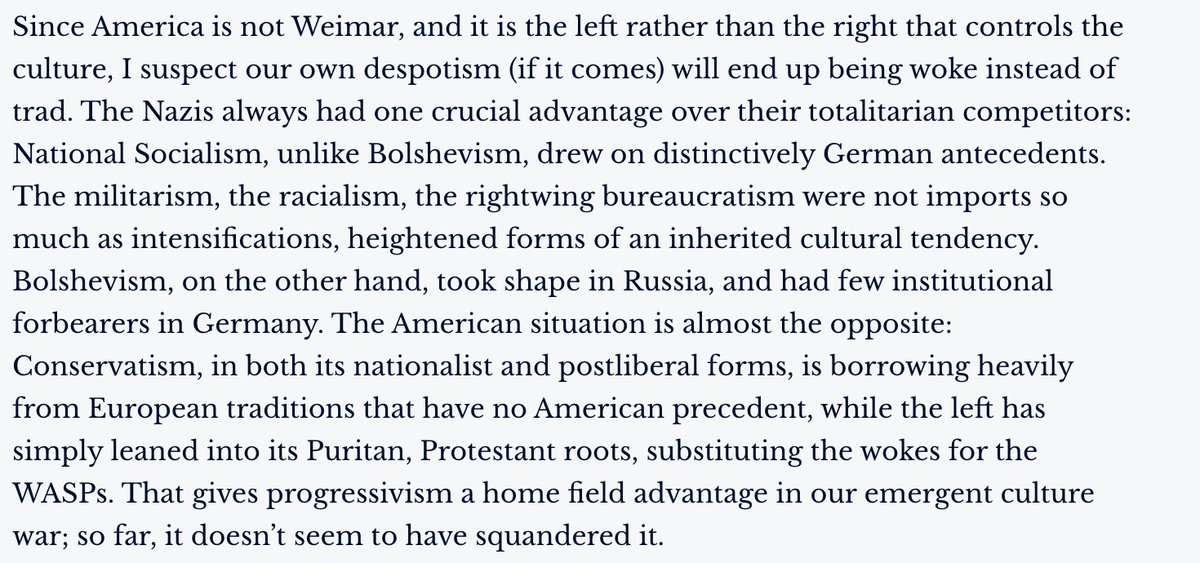America is not Weimar. We have not lost a World War or been forced to pay war debt; we’ve had 250 years of democracy, not 25; Trump isn’t Hitler, and Biden isn’t calling for communism.
And yet: there are some scary parallels. Let& #39;s start with the left. https://www.americanpurpose.com/articles/weimarization-american-republic/">https://www.americanpurpose.com/articles/...
And yet: there are some scary parallels. Let& #39;s start with the left. https://www.americanpurpose.com/articles/weimarization-american-republic/">https://www.americanpurpose.com/articles/...
This summer, America entered a still-ongoing period of civil unrest. Radicals took over city blocs, set fire to police stations, and destroyed countless storefronts. Shootings surged alongside lootings; the murder rate climbed.
What recalls interwar Germany here is not the chaos itself, but the way it has been excused, even encouraged, by those notionally in a position to stop it—many of whom seem ambivalent about whether the republic it threatens deserves defense.
Tellingly, the excuses all contradicted each other. If violence were extraordinarily rare, there would be no reason to deny its status AS violence or to defend its tactical value—whereas if looting weren’t violent, its attention-grabbing power would be extraordinarily diminished.
The contradictions suggest that the violence isn& #39;t rooted in ideology, but rather a kind of inchoate radicalism: a vague, burn-it-down impulse that has infected both sides of the aisle. And you& #39;d be hard pressed to find a better example of symmetric polarization than Weimar.
Part of the problem was that Weimar lacked a politically unifying moment in national history along the lines of the Declaration of Independence. A series of leftwing putsches left the Republic without an agreed-upon founding liturgy, exacerbating division and oikophobia.
The Left hated everything about Germany, from its culture to its constitution, while the Right hated the constitution because it was insufficiently German—which is to say, insufficiently authoritarian. Centrists had little cultural influence, especially in the universities.
Beyond their shared anti-Republicanism, all that the two sides had in common was their contempt for one another. The left derided the right as backwards-looking and chauvinistic, while the right derided the left as self-hating and unpatriotic—all of which was completely true:
Both groups also lacked any sense of proportion—especially the communists, who called everyone to their right, including the Social Democrats, "fascists," an overused charge many intellectuals nonetheless echoed. All this had three pernicious consequences.
First, it hallowed out the center and made compromise impossible. Status attached to radicalism, so most status-seeking individuals sought to subvert the Republic. This meant crises were chronically mismanaged, which further undermined faith in the political order.
Second, it caused each side to resemble—and thus to justify—the other& #39;s caricatures. The German right really did have an authoritarian, militaristic streak; the German left really was contemptuous of the German people. So both sides felt vindicated in their own extremism.
Third, it laid the groundwork for political violence. If the Social Democratic government was a fascist regime, peaceful resistance would obviously be futile. And if it was just a Trojan Horse for communists, preserving order would paradoxically require rightwing revolution.
Weimar& #39;s streetfighters were not terribly ideological themselves; many of them just wanted a thrill. But because elites had ideologized the violence, there was no non-polarizing way to address it. When the police did crack down on rioting, they just made everyone angrier.
Eventually, the chaos forced the Social Democrats& #39; hand: they could move far enough left to appease the communists, sparking a civil war; or they could ally with the illiberal but numerically dominant right, in the hope of keeping its worst elements at bay. They choose option 2.
We all know what happened next. But we don& #39;t know the counterfactual. Maybe a civil war would have torn Weimar apart. Or maybe Weimar would have become a Soviet satellite. Neither outcome would have been great for the Jews; the communists, after all, were fierce anti-Semites.
There is thus an element of moral luck in the way we remember Weimar. The Nazis WERE the greater of two evils...but mostly because they got the chance to be. And insofar as the communists enabled the Nazis, they were indispensable to Weimar’s tragic fall.
Much of this, the street violence and self-loathing in particular, resonated with Americans in the 60s. But there was still a strong, pro-America establishment that, when push came to shove, pushed back. E.g: No major newspaper denied 1776 was our true founding. Of course it was!
Fast forward to 2020. @nhannahjones& #39;s 1619 Project has been incorporated into several K-12 curricula. Foundational aspects of American culture are anathematized as “whiteness” by school districts, city governments, national museums, and even The Department of Homeland Security.
Mainstream magazines air calls to abolish the constitution (see below). And a group that calls itself “Antifa” is attacking police officers and mobbing mayors, while rightwing “citizen soldiers” patrol—and shoot up—the streets. https://newrepublic.com/article/159823/constitution-crisis-supreme-court">https://newrepublic.com/article/1...
There are very few actual fascists in America, of course. Far more common are accusations of fascism, which, as Weimar& #39;s left learned the hard way, have a centrifugal logic of their own. They delegitimize the current order, AND produce complacency about that delegitimation.
The right may soon learn the same lesson. Having been denied cultural and certain forms of political power, since 2016 it has taken an increasingly radical turn. Conservatives like @SohrabAhmari and @docMJP defend breaking present norms to reestablish (or "refound") older ones.
Which is understandable, but it also poses two big risks: that the left will harness the breakdown for its own ends (look at the "color revolution" rhetoric); and that the breakdown will make way for a much more radical right, which does not seek re-founding but regime change.
You see the second risk in the way that some postliberals have embraced a Weimar-esque vocabulary of revolution. @PatrickDeneen, for example, recently tweeted a list of "revolutionary" conservatives (e.g. @yhazony) who "seek an advance out of liberalism." https://twitter.com/PatrickDeneen/status/1284902502161190913">https://twitter.com/PatrickDe...
Our own conservative revolutionaries, like Weimar& #39;s, tend to be very vague about what that "advance" should look like. They& #39;re very good at critiquing liberalism (indeed, I agree with several of their critiques), but don& #39;t have much to offer in the way of a positive project.
It& #39;s important to understand that most illiberal intellectuals in Weimar were NOT Nazis. But by delegitimizing liberalism, they helped radicals on both sides gain steam. And the conservative revolutionaries of our own time may be playing a similar role:
So, unlike the 60s, both sides are behaving like radicals, the establishment isn’t yelling “stop,” and oikophobia is more evenly distributed, relative to its Boomer-era baseline. As Peter Gray said of Weimar, we are “dancing on the edge of a volcano,” oblivious to what& #39;s below.
And because both sides are behaving like radicals, each ends up confirming the perceptions of the other, which makes the dance difficult to disrupt. The right, accused of racism, has thrown its support behind a birtherist; the left, accused of lawlessness, has condoned riots.
There are thus no good options left for moderates. Vote Biden, and you& #39;re empowering a party whose platform parrots the tenets of critical race theory—a favorite foil for the Trumpian right; vote Trump, and you& #39;re empowering a man who seems hell-bent on vindicating those tenets.
It may not feel like we& #39;re on a volcano& #39;s edge, especially if Biden wins on Tuesday. After all, it did not always feel that way in Weimar. Things SEEMED to be cooling off in the mid 20s, but the stability proved deceptive. Polarization will likely worsen no matter who wins...
And without widespread respect for our civic heritage, there will be scant institutional ballast to constrain either pole. So if one of them wins a decisive victory over the other, the result could be a regime with truly tyrannical edge.
Since America is not Weimar, and it is the left rather than the right that controls the culture, I suspect the most likely tyranny is a kind of "soft totalitarianism," to use @roddreher& #39;s phrase. Unlike Bolshevism in Weimar, wokeness in America has very deep cultural roots.
Conservative revolutionaryism, on the other hand, is a European import, meaning it faces an uphill battle against the American Puritan tradition out of which wokeness springs. But even if I& #39;m wrong, the fact remains that each side is radicalizing the other in a vicious cycle.
Should the spiral end in a tyranny of left or right, then, the victims will bear some responsibility for their tyrants. And the tyrants will be able to say, truthfully, that their victims might not have been any better, thus reinforcing the regime. https://www.americanpurpose.com/articles/weimarization-american-republic/">https://www.americanpurpose.com/articles/...
This sort of cause-and-effect framework can seem harsh, even heartless. But it was Weimar& #39;s unwillingness to adopt it that ultimately pushed the Republic over the edge. We need what it lacked: an ethic of responsibility to temper our convictions. Otherwise, the lava awaits.

 Read on Twitter
Read on Twitter

